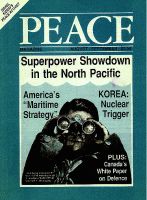
Peace Magazine Aug-Sep 1987, page 30. Some rights reserved.
Search for other articles by Chandler Davis here
Compared to physicists, American mathematicians have seemed relatively unaffected by military funding. The spectator might wonder whether this was because they had less chance at it or because they accepted it with less fuss. Now that many of them are balking, it is news.
Not that the issue is an entirely new one. Some of us can remember the early 605 when Wisconsin math professors were disturbed by the Army Mathematics Research Center. But this was less out of reluctance to help the military than out of a desire to preserve academic isolation. Most mathematicians concluded that the Center was a convenient way to get a semester's support now and again for the research they were already doing, and many took such semesters without doing an hour's worth of weapons-related work. The word "Army" was later dropped from the institution's name and misgivings were allayed.
A few years later, as the Vietnam War escalated, 400 mathematicians published a paid ad in the Notices of the American Mathematical Society. We stated our opposition to "putting mathematics in the service of this cruel war."
During the following decade military funding was not an issue. Some mathematicians did military work, and most of the others regarded this as a matter of individual decision. The present stir began with the threat to the National Science Foundation under Reagan. While straight scientific funding was tight, military budgets were hugely inflated. Some military research agencies set out (as in the early fifties) to fund mathematics per se. Reservations were expressed here and there. The source of some of the money was a joint project of DARPA (Defense Advanced Research Projects Agency) and the CIA. There were some cries of alarm about the CIA's record of dishonesty and manipulation, and the danger of interference with free publication of results. Some mathematicians reported that massive infusions of military bucks (from any agency) unbalanced their departments toward the favored specialties in a way that was scientifically unsound and personally unpleasant
A curious incident in New York pointed up these concerns. A meeting for presentation of research plans in dynamical systems, treated by some of the participants as a scientific workshop, was regarded by its military funders as a briefing session on how their money was to be spent. Accordingly, the meeting was closed. As a consequence, a few specialists not involved in the DARPA gravy train saw themselves excluded from an apparent scientific session.
The upset was strong enough to result in a stiff resolution at the AMS Council. Nobody resigned a research grant in protest, however. Since then, the awaited $5 million
DARPA grant has come through, but it is being handed out to a wider variety of specialties with vague assurances that freedom to hold meetings will not be restricted -- and the CIA's name has been taken off the project
Meanwhile, Strategic Defense Initiative (Star Wars) money is in the offing. It is hard to get figures on how much of it is already going to mathematics, but potentially the figures could be quite high. This money is seen as a menace. Mathematicians may have, just by virtue of their mental habits, more difficulty than other scientists in seeing how sound research can be done in an unsound setting. (What good does it do you, after all, to prove the Goldbach conjecture in an axiom system which includes "1=0"?)
In early 1986, a group of mathematicians began work organizing resistance to the military buy-out. The group included several high officers and past officers of the American Mathematical Society (AMS). It put together two resolutions expressing concern about the militarization of support for research and refusing to be involved in Star Wars research. Neither resolution called for the elimination of military funding, but for "efforts toward increasing the fraction of non-military funding for mathematics research.." The motions attracted over 400 co-sponsors.
At the semi-annual Business Meeting of the AMS, 22 January 1987, in San Antonio, because of a technicality, the motions were put on the agenda of the next business meeting. Supporters and opponents debated the merits nevertheless. In the end, the meeting decided to deal with the motions this summer and recommended their passage.
Debate has continued. The social responsibility of a mathematician n the face of weapons work is in the air more than ever before.
However, a leading mathematician was heard to mutter as the votes were counted in San Antonio, 'There they go, shooting themselves in the foot again." I think he meant that the profession will lose favor with the dispensers of government funds just by raising questions and that everyone's funding will suffer. We remember the Pentagon's Donald Hicks saying of academic questioners last summer, "If they want to go out and use their roles as professors to make statements, that's fine. It's a free country. . . and I'm free not to give money. I have a tough time with disloyalty." Perhaps the issue of military funding will be handled without any formal policy change by the American Mathematical Society. But let the questioning continue.
Chandler Davis is a Professor of Mathematics at the University of Toronto and a long-time opponent of militarism.

Peace Magazine Aug-Sep 1987, page 30. Some rights reserved.
Search for other articles by Chandler Davis here